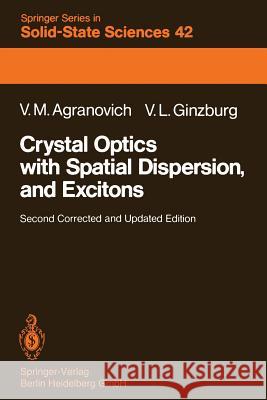Crystal Optics with Spatial Dispersion, and Excitons » książka
Crystal Optics with Spatial Dispersion, and Excitons
ISBN-13: 9783662024089 / Angielski / Miękka / 2014 / 447 str.
Spatial dispersion, namely, the dependence of the dielectric-constant tensor on the wave vector (i.e., on the wavelength) at a fixed frequency, is receiving increased attention in electrodynamics and condensed-matter optics, partic- ularly in crystal optics. In contrast to frequency dispersion, namely, the frequency dependence of the dielectric constant, spatial dispersion is of interest in optics mainly when it leads to qualitatively new phenomena. One such phenomenon has been weH known for many years; it is the natural optical activity (gyrotropy). But there are other interesting effects due to spatial dispersion, namely, new normal waves near absorption lines, optical anisotropy of cubic crystals, and many others. Crystal optics that takes spatial dispersion into account includes classical crystal optics with frequency dispersion only, as a special case. In our opinion, this fact alone justifies efforts to develop crystal optics with spatial dispersion taken into account, although admittedly its influence is smaH in some cases and it is observable only under rather special conditions. Furthermore, spatial dispersion in crystal optics deserves attention from another point as well, namely, the investigation of excitons that can be excited by light. We contend that crystal optics with spatial dispersion and the theory of excitons are fields that overlap to a great extent, and that it is sometimes quite impossible to separate them. It is our aim to show the true interplay be- tween these interrelations and to combine the macroscopic and microscopic approaches to crystal optics with spatial dispersion and exciton theory.











